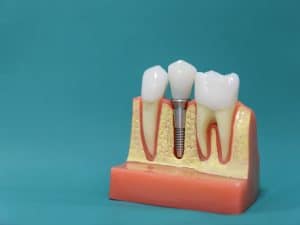Dental implants are an excellent solution for people who need to replace missing teeth, offering long-lasting results with proper care. However, not all dental implants are created equal, and when it comes to stability and durability, choosing the right type is key to ensuring your implant serves you well for years to come. This article will dive into which types of dental implants offer the best long-term stability and durability and how various factors contribute to their success.
What factors influence the long-term stability of dental implants?
Several factors play a crucial role in determining the long-term stability of dental implants. These include:
- Bone density: Stronger bone density helps ensure better integration of the implant.
- Implant design: The design and shape of the implant affect its ability to fuse with the bone.
- Oral hygiene: Keeping your mouth clean helps prevent infections that can impact the implant’s success.
- Overall health: Conditions like diabetes and smoking can affect the body’s ability to heal after surgery.
- Placement and alignment: The positioning of the implant can influence its long-term performance.
Taking these factors into consideration when choosing your dental implant can significantly affect the longevity and stability of the treatment.
Which dental implant materials are known for their durability?
The material used for dental implants significantly affects their durability. Some materials known for their strength and longevity include:
- Titanium: Strong and able to integrate with the bone, it is the most common implant material.
- Zirconia: Biocompatible and durable, it’s often used in cosmetic dental implants.
- Ceramic: Offering a natural look, ceramic is ideal for those with sensitivities to metal, making it an excellent option for metal-free dental implants.
- Titanium alloy: A blend of titanium and other metals, it enhances strength for patients needing stronger implants.
Consulting your dentist can help you choose the best material for your needs.
How do different types of implants compare for long-term success?
- Endosteal implants: These are the most commonly used type of implant. They’re inserted into the jawbone and provide long-lasting stability when the bone is healthy.
- Subperiosteal implants: These implants are placed on top of the jawbone and are often used when there is insufficient bone structure.
- All-on-4 implants: Ideal for patients who need multiple teeth replaced, this method uses four implants to secure an entire arch of teeth, offering excellent stability and durability.

Can the location of a dental implant affect its stability?
Yes, the location where the dental implant is placed can impact its long-term stability. Factors that influence this include:
- Jawbone quality: Implants in areas with more bone mass are typically more stable than those in regions with lower bone density.
- Stress distribution: Back teeth endure more pressure during chewing, so implants in these areas must be carefully placed to withstand the forces.
- Anterior vs. posterior implants: Implants at the front of the mouth (anterior) face less pressure than those in the back (posterior), influencing material and design choices.
The location of your implant will affect your dentist’s approach to treatment, ensuring it is correctly positioned for long-term success.
What are the benefits of titanium dental implants for durability?
Titanium dental implants offer several benefits, making them a popular choice for those seeking durable and long-lasting results:
- Osseointegration: Titanium bonds with the jawbone, providing a stable foundation for your new tooth.
- Strength and durability: Titanium is known for its exceptional strength, making it resistant to wear and damage over time.
- Biocompatibility: As a biocompatible material, Titanium is highly compatible with the human body, reducing the risk of rejection or complications.
- Minimal maintenance: Titanium implants require less maintenance compared to other materials, ensuring longevity with proper care.
Given these benefits, titanium implants are often the top choice for patients seeking a stable, long-lasting dental solution.
How can proper aftercare contribute to the longevity of dental implants?
Proper aftercare is essential to the success and durability of your dental implants. Some key aftercare tips include:
- Follow your dentist’s instructions: Adhere to any specific care instructions given by your dental team, including avoiding certain foods or activities.
- Maintain good oral hygiene: Brush and floss regularly to prevent infections and ensure your implant stays clean.
- Regular check-ups: Visit your dentist regularly to ensure your implant is functioning correctly.
- Avoid smoking: Smoking can impede healing and increase the risk of implant failure, so it’s best to avoid it.
- Eat soft foods initially: When eating with dental implants, it’s crucial to stick to a soft food diet after the procedure to prevent undue pressure on the implant while it heals.

By following these steps, you can help maximise the longevity of your dental implant and ensure its continued stability.
Which dental implant options are best for patients seeking long-term solutions?
If you’re seeking long-term solutions, consider the following implant options for optimal results:
- Single dental implants: These are great for replacing one missing tooth and provide a stable, long-lasting solution.
- All-on-4 implants: Perfect for patients who need a complete set of teeth replaced, these implants offer excellent stability and durability with minimal bone loss.
- Zirconia implants: Ideal for those looking for a more natural aesthetic, zirconia implants are highly durable and offer a strong, long-lasting solution.
Choosing the right types of dental implants depends on your specific needs. Therefore, consulting with an experienced dentist will help you make the best decision.
Why should you choose an experienced dental clinic for your implant procedure?
Choosing an experienced dental clinic for your implant procedure is essential for ensuring the best possible outcome. Here’s why:
- Expertise in implant placement: When considering professional dental implant services, choose a practice with experienced dentists who know how to place implants correctly for maximum stability and success.
- Access to the latest technology: Top clinics use advanced technology, such as 3D imaging, to plan and execute your implant procedure with precision.
- Comprehensive care: An experienced clinic provides ongoing support and aftercare to ensure your implant stays in top condition.
- Personalised treatment: Your dentist will tailor the implant procedure to meet your specific needs and ensure the best long-term results.
Choosing a reliable and experienced dental clinic, such as Marsfield Dental Care, guarantees you’ll receive the best possible care for your dental implants.
Get In touch with Marsfield Dental Care
If you’re looking for high-quality dental implants in Sydney, Marsfield Dental Care offers expert services in dental implants and a range of other treatments. With a family-owned focus, multilingual staff, and cutting-edge technology, we are committed to providing you with the best care. Contact Marsfield Dental Care today to schedule a consultation and start your journey to a healthier smile!

